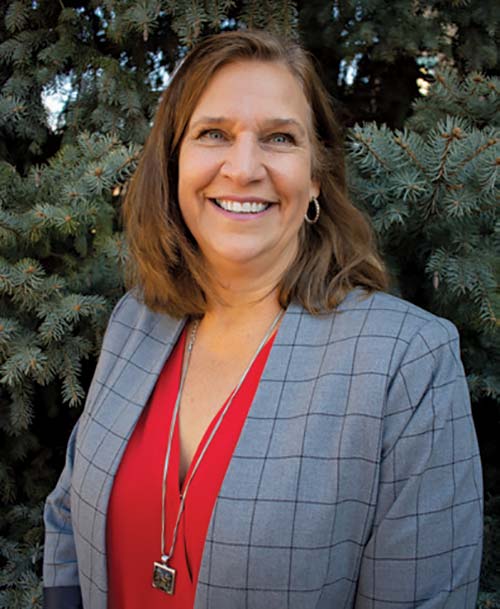
Rural Prosperity Nebraska in Action:
Bringing Nebraska Communities Together for Economic Success

Small, rural communities in Nebraska are home to an abundance of unique businesses, cultures, and people. These communities face everyday challenges to remain economically viable and thrive during changing times. To combat unique challenges, recent collaborative programs between the university and communities are seeing positive outcomes.
Marilyn Schlake, Nebraska Extension educator at the University of Nebraska–Lincoln, works to build the capacity of rural communities in Nebraska as part of the Rural Prosperity Nebraska.
“Rural Prosperity Nebraska focuses its effort on building the entrepreneurial, economic, and social capacities of small towns throughout the state,” Schlake said. “Building strong communities through Nebraska Extension programming and research help Nebraskans build and retain a strong, stable economy.”
Community Prosperity and Engagement
Rural Prosperity Nebraska works directly with Nebraska communities to customize engagement for each community to retain current residents and recruit new ones.
Specifically, this group helps battle one of the largest issues facing rural Nebraska – declining populations. Depopulation is defined as a documented change in rural communities for roughly three decades that is causing issues in the economic tax base, schools, healthcare, and overall quality of life for residents.
Schlake said rural towns can fight this issue by building vibrant communities with strong leadership.
“In order to have a strong Nebraska, we need strong communities,” Schlake said. “In order to have strong communities, we need strong businesses and people that are willing to step up and provide leadership in their communities.”
Rural Prosperity Nebraska works with communities to generate data from their residents, identify issues, and create action plans.
Specifically, Schlake works on three projects addressing concerns within rural communities: 1) Entrepreneurial Community Activation Process, 2) Marketing Hometown America, and 3) Stronger Economies Together.
Entrepreneurial Community Activation Process (ECAP)
ECAP encourages and supports entrepreneurship and business innovation in small communities by targeting economic improvement.
Schlake said ECAP offers communities the option to survey their residents to collect data on leadership, infrastructure, entrepreneurial support, culture, sense of place, and the workforce, to identify areas needing improvement.
“By understanding their opportunities, unique characteristics and assets, communities are able to set goals and create change,” Schlake said.
Communities have implemented improvements including business loan programs, new community facilities and greater communications through social media and community information websites.
Positive outcomes from this program include increased engagement, communication, and opportunities for enacting change in the community, according to Schlake. Additionally, the program helps communities form unified goals and create action plans.
“Overall, the program is one way for a community to share the resources that it already has in order to grow and benefit the public as a whole,” Schlake said.
Marketing Hometown America
This program focuses on the recruitment and retention of new residents to small, rural Nebraska towns.
“Based of prior work, the Marketing Hometown America (MHA) team uses research on what attracts people to move to a community, why people pick a specific community, and how it feels to be a part of that community,” Schlake said.
Using this information, community members evaluate resources, strengths, and weaknesses and create action plans.
Most importantly, Schlake said MHA allows communities to learn what new residents look for when they relocate to a rural community – and meet those expectations. Communities also discover previously overlooked local assets that attract new residents creating a welcoming community spirit.
This program works with community members in small group study circles to discuss what makes their community special, how they receive new residents, and how the current residents feel about living there.
The positive study circles conversations typically lead to the development and implementation of a community marketing action plan.
Stronger Economies Together
This collaborative project between several universities, USDA Rural Development, and National Extension focused on bringing communities together to realize their potential.
Five counties in Southeast Nebraska came together in order to create a regional development plan in 2015 to utilize their potential as a region, according to Schlake. Today, community-led teams are implementing the vision created through this program.
The community groups who generated ideas for this project, Partners for Progress, included over 110 individuals from Johnson, Nemaha, Otoe, Pawnee, and Richardson counties in education, business, nonprofits, economics, government, and media, Schlake said. Partners for Progress formed a plan to activate the region’s ability to serve as a hub for industry, tourism, and entrepreneurship.
By doing so, the Partners for Progress found common ground between communities and set goals in art and entertainment, manufacturing, workforce and entrepreneurship in southeast Nebraska. Key projects included promotion of manufacturing to the next generation and saving a vital business and hundreds of jobs when they helped to secure a new buyer for a closing manufacturer in Auburn
The Partners for Progress further focused on an entrepreneurial goal, as 93% of the businesses in the region have 10 or fewer employees. By encouraging and supporting entrepreneurship, the Partners for Progress knew they could create a stronger and more diverse economic base for the region.
“Focusing on building and maintaining a workforce is necessary to prevent depopulation and the Stronger Economies Together project brought jobs to the area,” Schlake said.